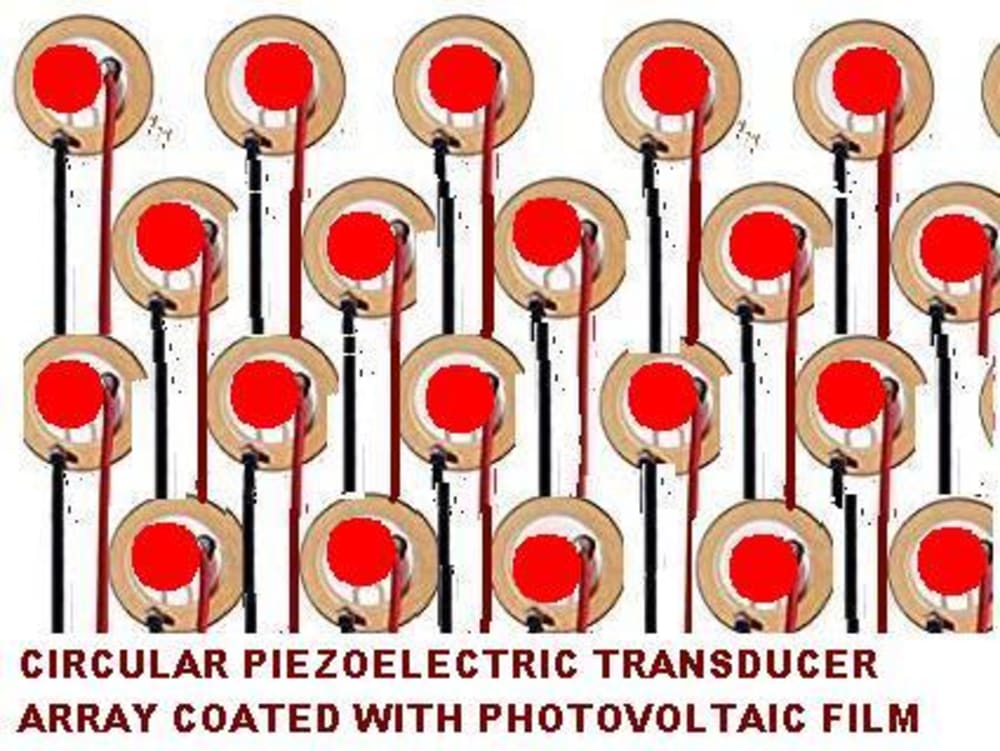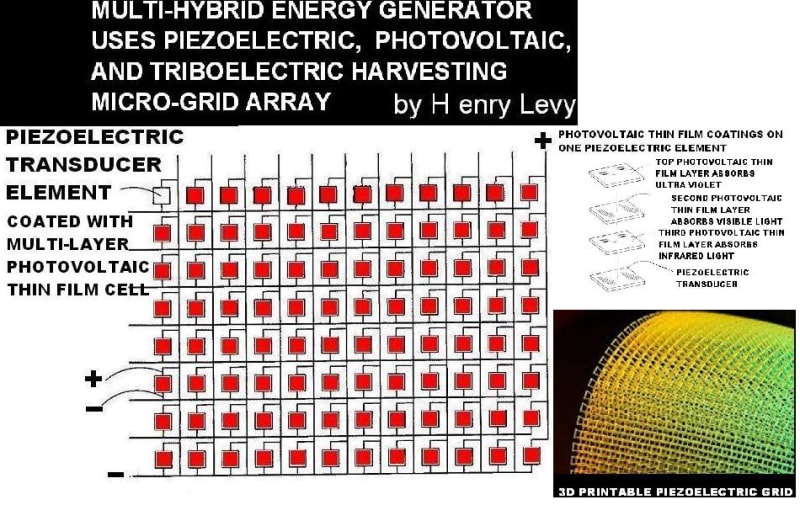A green means of generating electricity from the pitter patter of falling rain drops and sunshine is described here. A falling rain drop strikes at least one piezoelectric element (coated with multi-layer photovoltaic flexible thin films) of a micro-grid array comprised of many piezoelectric elements. The rain drop imparts its momentum from falling to the struck coated piezoelectric element(s) through its flexible coating converting the rain drop's kinetic energy to electricity. When a piezoelectric crystal is squeezed, deformed, compressed, bent, or struck, it generates electricity via the piezoelectric effect. The piezoelectric element can be a crystal, a ceramic, PZT, a plate, a wafer, scintered crystal mixture multi-layer sandwich, a stack, or a film. Each element is coated on top with a multi-layer flexible photovoltaic film cell by various deposition techniques (vacuum deposition, ion sputtering, vapor deposition, 3d printing). The top film layer absorbs ultraviolet light, the second layer absorbs visible light, and the third layer absorbs infrared light. Piezoelectric / solar grid arrays can be printed by 3-D printers on flexible materials and can also be manufactured as MEMS (Micro Electro-mechanical Mechanisms). Generally, a rain drop striking the coated piezoelectric element compresses, bends, or deforms the element thereby generating electricity via the piezoelectric effect and sunlight energizes the stacked multi-layered photovoltaic film cell. Water falls through the interstitial grid holes. Each piezoelectric / photovoltaic element has at least four wires attached to typical well known interface electronics adapted to be coupled with piezoelectric transducers and photovoltaic cells whose output is then connected to an energy collecting or energy storage device such as a rechargeable battery, a super-capacitor, or other storage means. When the sun is shining, the photovoltaic multilayer flexible thin film coating on the piezoelectric element's top surface generates electricity.
Static electric charge frictionally accumulates on falling rain drops as they rub air, clouds, and other rain drops that they pass while falling. Triboelectric energy (frictionally generated static electric charge) harvesting methods can be employed simultaneously to recover and use the static electric charge accumulated on each fallen raindrop.
Whiskers or fine wires reaching out over the piezoelectric micro-grid can wipe charge off the raindrops without robbing them of much of their kinetic energy.
Once built, this invention requires no electricity input, fuel, or wind, and will work rain or shine. It can also be configured to use the wind to create vibrations in the piezoelectric elements to generate power.
The system can recover and store energy from the rain, the sun, and the wind.
Roof top and wall rain drop solar electric generators can be placed on buildings and houses. Floating island rain drop solar electric generators can also be put into and anchored in rivers, lakes, and oceans.
In this way, the energy of falling rain drops and sun light can be captured, harnessed, saved, and used without heating or contaminating the environment with carbon dioxide, carbon monoxide, combusted fuel end products, radioactive waste, or other environmental contaminants all while conserving space by a multi-hybrid structure.
Like this entry?
-
About the Entrant
- Name:Henry Levy
- Type of entry:individual
- Software used for this entry:MTCROSOFT PAINT
- Patent status:none





